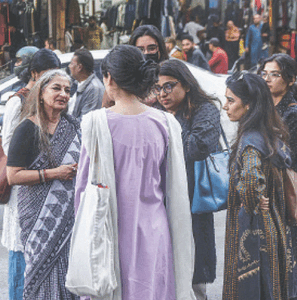KARACHI, Nov 2: Despite the approval of the feasibility of Karachi Circular Railway (KCR) revival project by the Sindh government about six weeks back, no headway has been made in this direction so far, due to the same old traditional attitude of our bureaucracy towards the solution of the problems of the masses.
On September 16, Sindh Transport Minister Adil Siddiqui announced that the Sindh government had formally approved the feasibility of revival of the KCR and would be submitted to the federal government within a week, so that a sift loan could be obtained from the Japanese government for the same.
According to details, the project will be completed in three phases and its reach will be extended to Surjani, North Karachi, Airport, Gizri, Defence, Port Qasim and other areas. In the first phase, the KCR will be revived from the Karachi City to Nazimabad, in the second phase from Nazimabad to Drigh Road, and in the third phase it will be extended to airport and other areas.
The entire system of the KCR will be computerised and a separate track will be laid from Karachi City to Drigh Road, and all railway lines, signals and stations with commercial centres will be developed on modern lines for the KCR.
However, despite passage of six weeks there seemed no visible development and it seemed that the bureaucracy has yet to realize the importance of this plan, which could alleviate sufferings of the Karachiites and bring the city into the fold of mega urban cities with an efficient means of public transport.
The Pakistan Railways had started the KCR in 1969 and closed it down in 1999 on the pretext of losses. It is worth noting that the KCR had earned half a million rupees in the first year alone, when it used to charge mere 0.25 paisas per ticket. In 1970s, the KCR used to run as many as 104 trips daily.
Logically, the KCR which bagged half a million rupees during its first year of operations had to economically thrive with the passage of time due to increased population of the city, but instead it incurred losses and was ultimately closed.
Due to the hue and cry of the Karachiites, the government decided to revive it in 2004 and its first phase between Landhi and Wazir Mansion stations was revived in 2005. But again the nexus of transporters and bureaucracy managed to block work on its second phase.
Despite tall claims by the high-ups of federal, provincial and city governments regarding the early revival of the KCR, no one is coming forward with a solid plan and a specific time schedule for this vital plan. Recently, Minister of State for Railways Ali Asjad Malhi was quoted as saying that the circular railway service would be launched in eight cities including Karachi and Lahore.
Responding to a question during question hour on the floor of assembly he said that in the first phase, feasibility of Karachi station to Dhabeji station and Karachi City to Malir Cantonment had been completed. He said that a plan was being worked out for launching Karachi Urban Transport Corporation and laying down a two-way railway track for KCR was under consideration.
Interestingly, a year back in November 2005 this matter was discussed between Sindh Chief Minister Dr Arbab Ghulam Rahim and State Minister for Railways Ishaque Khan Khakwani during their meeting at the CM House Karachi and it was decided to set up a corporation named Karachi Urban Transport Corporation for running the KCR to facilitate Karachi commuters; however, despite the passage of an entire year nobody is aware of the progress made in this regard.
However, City Nazim Syed Mustafa Kamal, in the second week of May 2006, visited Islamabad and called on Federal Railways Minister Shaikh Rasheed Ahmed to discuss the revival of KCR. After the meeting a press release was issued by the city government, which said that the federal government had agreed to completely revive the KCR, besides implementation of the mass transit programme.
It claimed that the railway minister completely agreed to the proposal of KCR revival and assured that the federal government and especially Railways Ministry would provide all-out assistance in this regard.
It might be recalled that a team of technical experts of Japan last year completed initial feasibility report for the KCR revival and submitted it to the Sindh governor. However, according to the reports, this feasibility report was not approved as it suggested a long period for the revival work.
The KCR system encircles major parts of the city. It runs parallel to the main business area of Sharea Faisal. It touches I. I. Chundrigar Road, which is less than one kilometer from Kharadar, half a kilometer from the Fish Harbor, and one kilometer and a half from Lea Market. In the past it catered to the needs of the densely populated residential areas including Masoom Colony, Chanesar Goth, Sindhi Muslim Society, PECHS, Mohammad Ali Society, KDA Scheme 1, Baloch Colony, Mehmoodabad, Karsaz, Shah Faisal Colony, Drigh Colony, Quaidabad, Malir Colony, Landhi, Gulshan-i-Iqbal, Federal 'B' Area, Karimabad, Nazimabad, Paposhnagar and Sher Shah.
It is said that some foreign firms are interested in running the KCR. There are also talks about getting foreign loans for this project. But in fact the Pakistan Railways (PR) is competent enough to complete this plan from local funding. The Karachi commuters demand a solid, concrete plan for the revival of KCR with a specific deadline.
They hope that the federal government would approve the feasibility of KCR soon and order physical launching of this much-awaited urban transport plan.—PPI
































